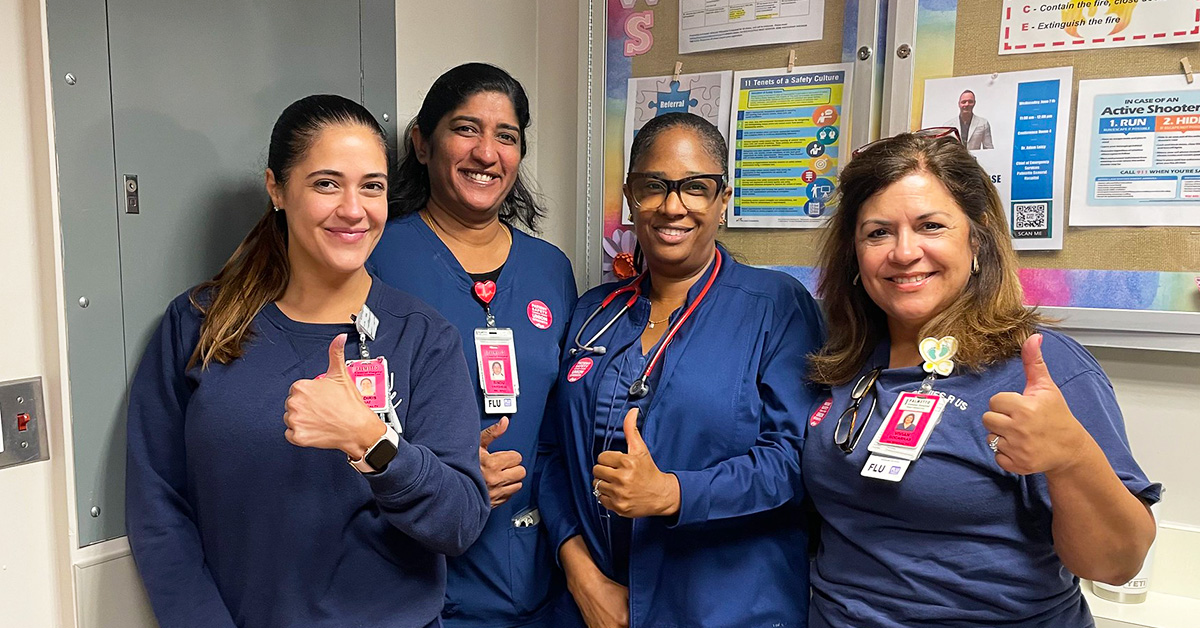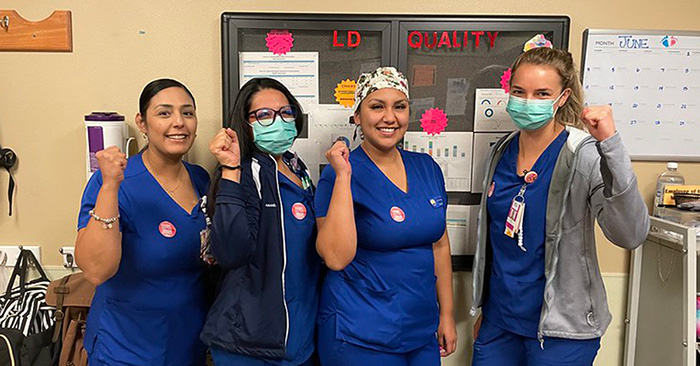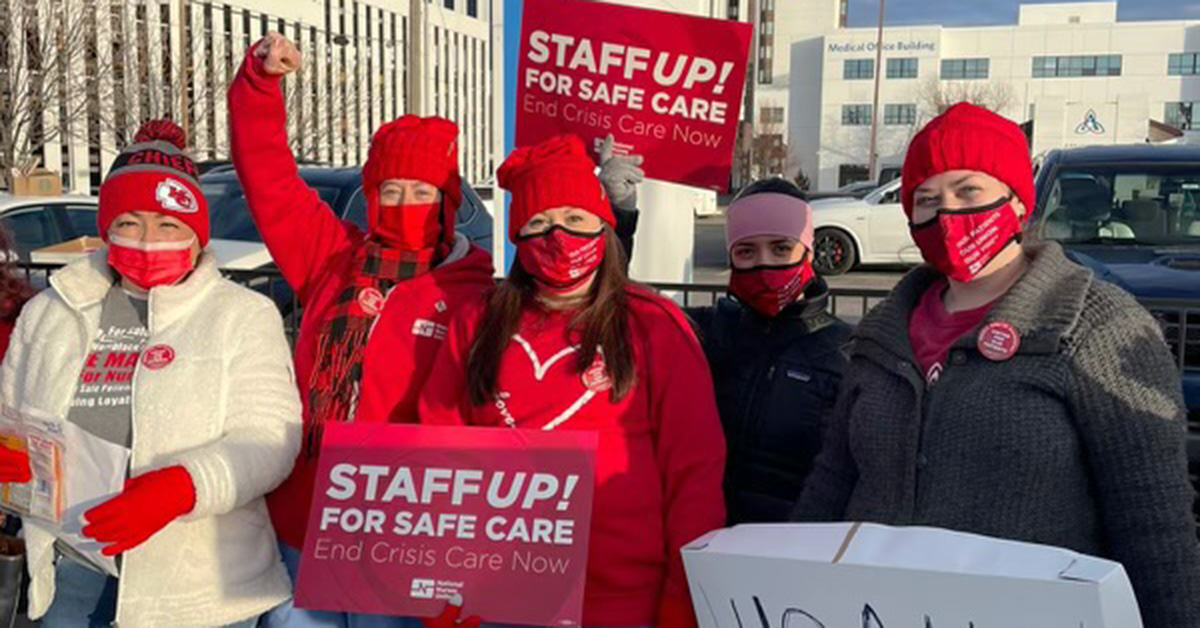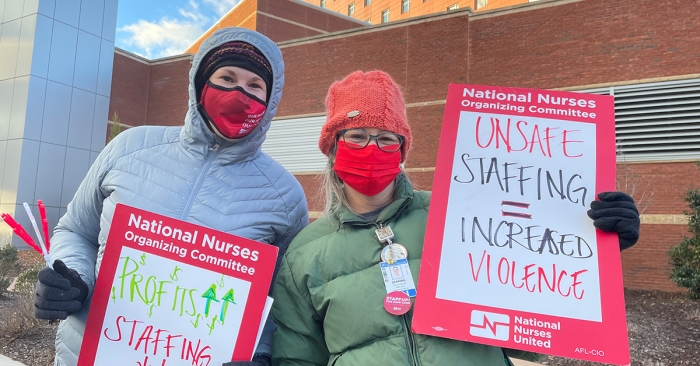Three affirmations for today’s union nurse

Things all nurses should and must hear to stay true to themselves and the profession
By Michelle Morris
National Nurse Magazine - July | August | September 2023 Issue
Not gonna lie. It’s brutal at times being a registered nurse. Our jobs were already hard before the pandemic. Our position is already an impossible one: We practice nursing and act as advocates for patients within a corporate health care industry that does not prioritize the healing and care of humans, but profits. We and our employers have opposing goals; always have and always will until we wake up and remove the profit motive from health care.
Then when Covid hit, any pretense that our employers respected and valued us vanished completely. We tend to block traumatic memories, but many of us still recall how we had to fight for our one N95 per week (or month!), or to not be forced to rewear the “processed” N95s that reeked of chemicals. Or how they never fixed the negative pressure rooms or how they insisted on giving us mixed positive and negative patient assignments even though that was not safe for our patients, ourselves, nor our families. Or how they couldn’t even keep the Sani wipes stocked.
While we all tolerate less-than-ideal conditions during times of emergency, our employers perversely exploited the pandemic to accustom us and our patients to accept crisis standards of care as the new normal. Staffing on our floors is worse than ever. Pile on all the other injustices and indignities they throw at us -- just-in-time everything, workplace violence, closures of critical units, and always cuts, cuts, cuts -- it’s oppressive. Many of us are leaving direct-care nursing, or contemplating it, because we just can’t take it -- not the risk, the stress, the moral injury that comes from knowing we’re not doing right by our profession and our patients.
But we are union nurses, and we don’t do the whiny pity party thing. We can all see that nursing is at a crossroads, and we want to offer some positive words of affirmation.
But these are not Oprah-eque, Gwyneth-like affirmations that involve aromatherapy candles and wellness de-stress bracelets. Oh no. These are truth-to-power affirmations for today’s union nurse. These are things that all nurses must hear to stay true to themselves and true to our profession. These are words to embolden you and provide a touchstone when you encounter all the obstacles our employers push in our nursing path. We hope they spur you to action in your hardest moments.

You play a valuable, critical role and are irreplaceable.
Nothing can replace the connection of in-person and hands-on experiences. From our nursing education, clinicals, to early on-the-job practice, we learned not only how to perform basic nursing skills but also to use all of our senses during the nursing process to observe for subtle signs of physical and emotional distress and then intervene appropriately. As we spend more and more hours at the bedside, our intuition grows and sharpens. That intuition – the knowledge of what to pay attention to when we use our senses to assess patients – is invaluable and irreplaceable.
Simply put, there are no shortcuts in nursing, a profession that deals with the physical, emotional, and ethical complexities of healing humans. You are infinitely smarter and more capable than a robot or software algorithm.
Yet, that’s exactly what the hospital industry is trying to do: Remove us registered nurses from the sides of our patients and try to replace us with technology. The plans range from virtual ICUs, to more telehealth interactions, to schemes that we like to call Home All Alone programs.
Home All Alone programs are directly opposed to the hands-on human-to human-approach to nursing we know is the key to quality patient care. This is no surprise to National Nurses United – the hospital industry has long wanted to automate our skilled profession by reducing people to a list of symptoms that can be measured by technology. As care is taken out of the hospitals, industry players will close hospitals to increase profits and leave more and more communities without full-service, acute-care hospitals.
Stranding patients at home this way is just wrong! The entire reason for that patient to be admitted to the hospital is to benefit from 24/7 monitoring, assessment, and professional care that licensed registered nurses provide. Nurses, more than any other health care staff, spend the most time with patients. Do we really believe that iPads, cameras, monitors, and the occasional visit by likely lesser-skilled and unlicensed personnel are in any way comparable to the skilled, expert nursing care and social emotional support we RNs provide every moment of every shift?
But Covid-19 has opened up the hospital industry’s ambitions to normalize remote and automated care so they can decentralize patient care (in other words, cut labor costs by justifying the need for fewer registered nurses).
In the face of these threats, we have to stand together to resist efforts to deskill our profession. Our strength is in asserting what only nurses can offer that no technology can: The ability to combine the physical, psychological, and emotional needs of a patient with compassion, empathy, and advocacy to honor the dignity in all people.

There are plenty of us nurses.
Employers want us, the public, and lawmakers to believe that they cannot staff properly because there are simply not enough nurses. That is a lie. National Nurses United has been calling the hospital industry’s bluff on the so-called nurse shortage. Hospital industry executives conveniently hid behind the Covid-19 pandemic to deflect scrutiny on their decades-long campaign to decrease inpatient beds – particularly in units like pediatrics, deemed less profitable – and short-staff units in order to maximize profits. The result? Manufactured crisis conditions, most recently with the 2023 winter surge in RSV, influenza, and Covid-19.
All of their “shortage” propaganda might trick even veteran nurses into believing that everyone’s retiring and nobody is coming up in nursing. Wrong.
What the hospital industry doesn’t want you and the public to know is that the number of candidates who passed the nursing licensure exam has actually steadily grown. In fact, every year, the United States continues to graduate more new nurses out of nursing school than ever before.
So then, the question must be asked: Why are there approximately one million registered nurses with active licenses who are not employed as RNs? And, consider this: Might these 1 million nurses have anything to do with the turnover rate at hospitals being the highest it has ever been, at 27.1 percent? We certainly think so, and know you do, too.
“We’re the most trusted profession in America because we do everything in our power to take care of our patients, whether it’s at the bedside or on the streets to fight back against corporate greed,” says NNU Executive Director Bonnie Castillo, RN, referencing polling that, for the last two decades, has found people in the United States rank nursing as the most honest and ethical profession. “That’s why NNU is leading the charge for staffing models that adequately protect patients, nurses, and our communities against public health crises.”
Look no further than California, which passed minimum nurse-to-patient ratios as a result of the dogged advocacy of NNU’s California affiliate, California Nurses Association. Patients, nurses, and hospitals are seeing the difference. Because of the minimum ratios, California hospitals are less burdened by the staffing crisis. Nurse employment grew significantly faster in California compared to other states after its nurse-to-patient minimum ratios were implemented.
When you boil down the issue, it’s as simple as nurses appreciating being able to practice nursing under a safe working environment and actually getting to spend time with their patients. Anything less offers only the illusion of improvement – and of course, the hospital industry is happy to cut corners to maximize executive and shareholder profit.
Take, for example, “gig nursing.” Led by technology investors looking to make a quick buck and health care employers looking to cut costs, “gig nursing” would apply the same exploitative gig-work employment model (à la Uber and DoorDash) to nurses – misclassifying us as independent contractors and depriving us of the rights and benefits granted to regular employees. At a time when many of us are fed up with overwork, understaffing, and moral distress, the flexibility these health care gig work apps claim to offer is understandably appealing. But we have to remember: Flexibility at work and benefits (including union rights) at work aren’t mutually exclusive. That’s a false choice presented by for-profit forces who benefit from stripping us of our rights.
We also shouldn’t fall for the false solution of compact licensure. Proponents claim that it would address the staffing crisis, but of course it doesn’t call for nurse-to-patient minimum ratios or other guidelines that would improve working conditions. Instead, what it actually does is take power from your state’s nursing board and hand it over to a national organization with little oversight and a comfortable relationship with corporate sponsors, including those in the pharmaceutical industry.

When nurses fight together, we win.
As NNU nurses, we are constantly pushing against the treacherous headwinds of a health care industry that is relentlessly focused on profits. We’ve accomplished so much, despite the odds (including an unprecedented pandemic), because we’ve stood and fought together.
“We know that the only way to build union nurse power is to demand, organize, and fight for what we need to protect ourselves and our patients,” said NNU President Deborah Burger, RN. “It’s this fearless attitude that has led to so many incredible wins during some of the hardest years of our lives – and it’s what will help us maintain and advance the high standards of nursing we’re proud to fight for.”
In the first three years of the pandemic, CNA/NNOC nurses took incredible initiative for public health, winning essential protections like personal protective equipment and routine testing.
From red scrub Fridays, to marches on the boss, to strikes, we engaged in 5,000 workplace actions to challenge employers and win improvements.
We won standards and new laws to develop more robust protections against future public health emergencies, including a national emergency standard on Covid-19 in health care settings. That was a momentous victory since they are issued so infrequently that the last one was in 1983, almost four decades ago. Now, it’s on the path toward permanency.
And in thousands of collective bargaining agreements, we used our power to win major improvements in workplace conditions and staffing at our facilities. In just the last year, 75,000 nurses at 120 facilities won strong contracts (and some, first contracts).
We’ve won 19 new union elections covering nearly 7,500 nurses since 2020 – organizing everywhere to build our power and prevailing against blatant union-busting (and naysayers who said we couldn’t possibly win). That includes victories in staunchly pro-business, anti-union environments like Asheville, N.C. and Wichita, Kan.
Nurses are a force to be reckoned with! Our power is only growing and we’re going to prevail against our employers and the hospital industry with our solidarity!
Michelle Morris is a communications specialist at National Nurses United.